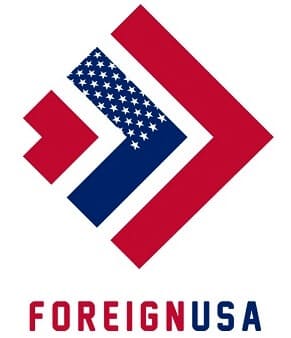Moving to a new country where the native language is spoken can be an exciting adventure, but it can also come with unexpected challenges.
For British immigrants moving to the US, the differences between British English and American English can prove to be an unforeseen obstacle.
While the prevalence of American media and the social media boom has made exposure to other cultures part of daily life for most younger Brits, some common US words and phrases might seem obscure, confusing, or even outright silly to those of any age who were raised speaking British English.
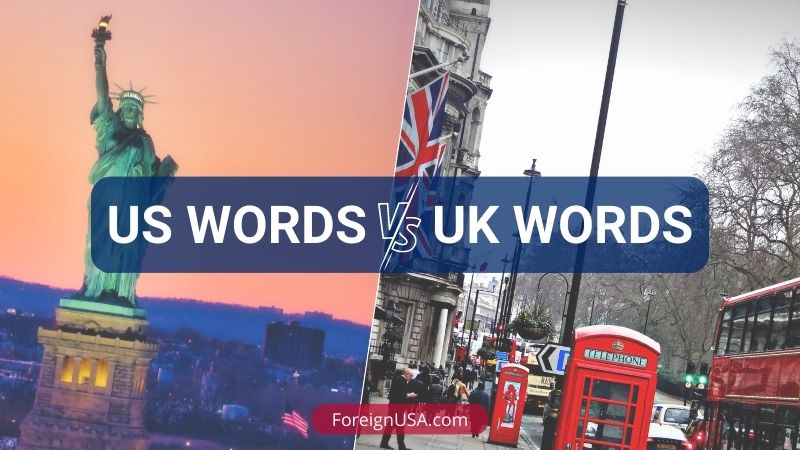
Food Fumbles with British Words vs American Words
One of the biggest challenges for British people moving to the US is adjusting to unfamiliar words for familiar items.
For example, when shopping for groceries, they might ask for an aubergine, coriander, or a courgette, only to be met with a blank stare.
However, if they point out the items on the shelf, the clerk will immediately recognize them as eggplants, cilantro, and zucchini.
Similarly, searching for biscuits will lead to buttery scones, which aren’t quite as easy to dunk in tea as British biscuits!
Other commonly used words in the UK, such as “prawns,” might turn up more than one kind of crustacean. So, in the US, you must generally ask for shrimp instead.
Cooking and shopping using recipes in American English might also be challenging at first, but with some cross-referencing and a few quick Google searches beforehand or in the store, most Brits won’t have much trouble adjusting their grocery lists to match the labels on US shelves.
Alternatively, if you want a quick reference guide to help you out when doing your grocery shopping in the US, then download and print our graphic below that has all the most common foods, vegetables, and ingredients you are likely to encounter on your next food shop (sorry, grocery shop!).
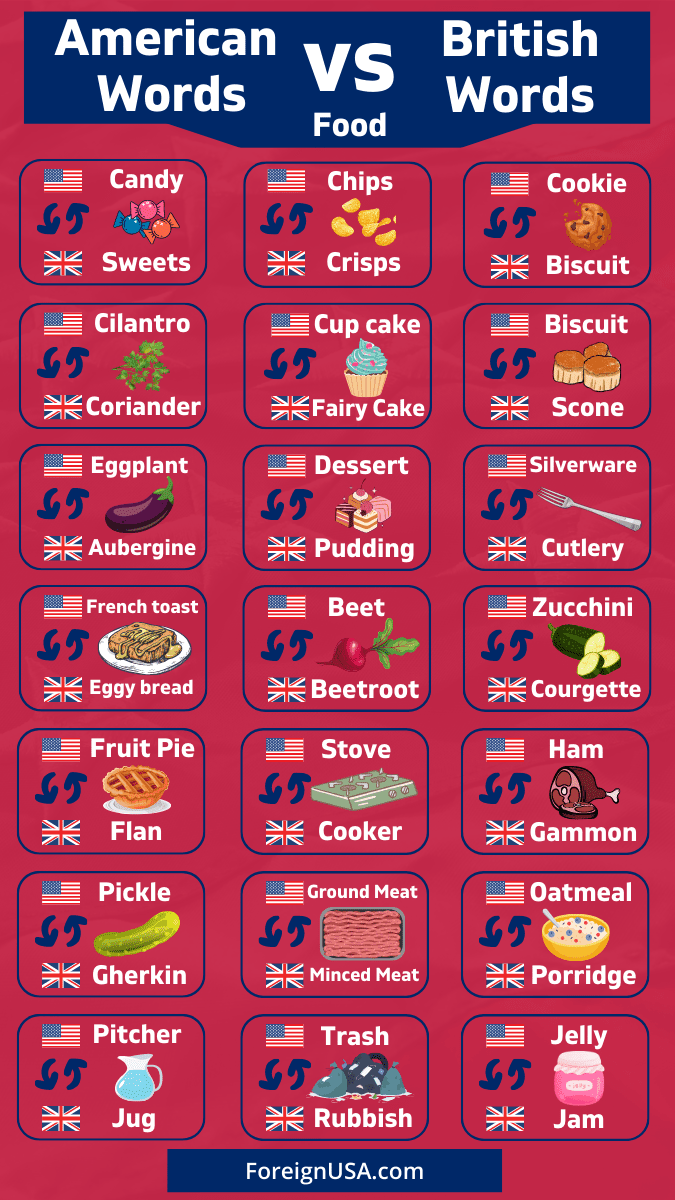
British Words vs American Words Food List
In addition to the downloadable graphic above, we have created a comprehensive table listing all the British vs American food and food-related item comparisons:
| American Word | British Word |
|---|---|
| Eggplant | Aubergine |
| Beet | Beetroot |
| Cookie | Biscuit |
| Molasses | Black Treacle |
| Lima Bean | Broad Bean |
| Candy | Sweets |
| Fries | Chips |
| Zucchini | Courgette |
| Cilantro | Coriander |
| Chips | Crisps |
| French Toast | Eggy Bread |
| Cup Cake | Fairy Cake |
| Apple Cobbler | Apple Crumble |
| Ham | Gammon |
| Pickle | Gherkin |
| Confectioner's Sugar | Icing Sugar |
| Ground Meat | Minced Meat |
| Smoked Herring | Kipper |
| Bell Pepper | Pepper |
| Oatmeal | Porridge |
| Dessert | Pudding |
| Trash/Garbage Bags | Rubbish Bags/Bin Bags |
| Biscuit | Scone |
| Green Onions | Spring Onions |
| Grilled Cheese | Cheese Toastie |
| Shrimp | Prawn |
| Soda | Fizzy Drink |
| Can | Tin |
| Plastic Wrap | Cling Film |
| Stove | Cooker |
| Silverware | Cutlery |
| Pitcher | Jug |
| Trashcan | Bin |
| Grocery Store | Supermarket |
| Groceries | Shopping |
| Takeout | Takeaway |
| Jello | Jelly |
| Dishes | Crockery |
British vs American Clothing Confusion
Shopping for clothes, especially online, can also be a headache for those choosing between British and American words.
Searching for a sleeveless “vest” online is likely to pull up pages and pages of waistcoats, while a search for a “house coat” or “dressing gown” will almost exclusively result in listings for bathrobes.
For a British fitness enthusiast or those that want to wear casual footwear, it might make very little sense that their multi-purpose “trainers” are narrowed down to being called just “sneakers” in the US.
“Trousers” sound old-fashioned to an American English speaker, but telling a British English speaker you forgot to pack “pants” for your trip will have them wondering how you could forget to bring your underwear!
Below is a graphical summary of the differences between British vs American clothing, as well as some other similarly related things that have different words in both language variations:
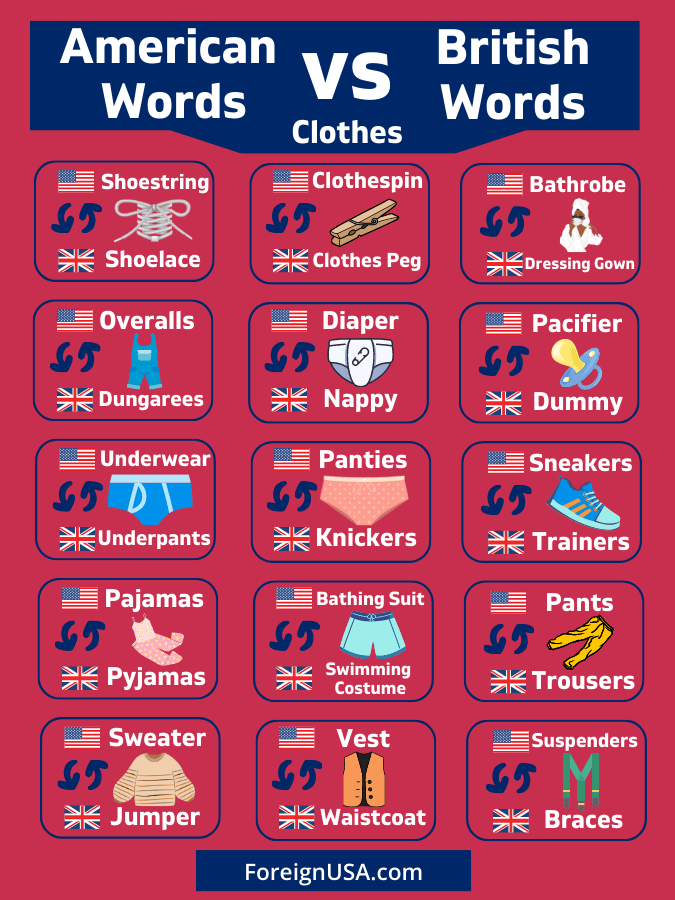
British vs American Words Clothing List
The table below lists all of the common clothing differences between British vs American words, with the addition of some other similar items often confused:
| American Word | British Word |
|---|---|
| Shoestring | Shoelace |
| Clothespin | Clothes Peg |
| Bathrobe | Dressing Gown |
| Overalls | Dungarees |
| Diaper | Nappy |
| Pacifier | Dummy |
| Underwear | Underpants |
| Panties | Knickers |
| Gym Shoes | Plimsolls |
| Pajamas | Pyjamas |
| Bathing Suit | Swimming Costume |
| Sneakers | Trainers |
| Pants | Trousers |
| Vest | Waistcoat |
| Wellingtons | Wellies |
| Sweater | Jumper |
| Undershirt | Vest |
| Suspenders | Braces |
UK vs US Words: Driving Differences
British drivers in the US must also acquaint themselves with the unfamiliar car and driving terms.
In the US, what they call a “boot” is a “trunk,” a “bonnet” is a “hood,” and “lorries” are “semis” or just “trucks.” Drivers in the US use their “blinkers,” not their “indicators,” before turning and fuel up their vehicles at stations pumping “gas,” not “petrol.”
Remember, you are not looking for a petrol station, you are looking for a gas station when you next need to fill up in the US, and while you are at it, make sure you are driving on the right side (literally) of the road, not the left!
Although context makes the meanings of these words relatively clear, British drivers might find they take some getting used to. For example, a Yield sign in the U.S. is equivalent to a Give Way sign in the UK.
As you can see from the graphic below, there are quite a few differences in driving terms with US vs UK words. Fortunately, we have provided you with all the tools to become an expert at deciphering the differences:
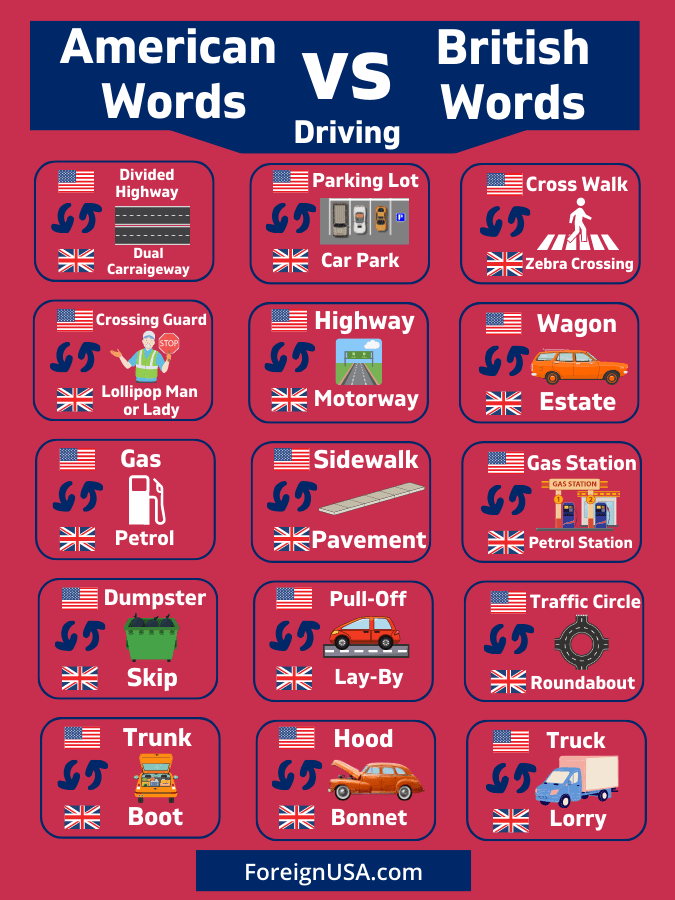
US vs UK Words Driving List
The table we have created below displays all of the driving and driving-related differences in words between the US vs the UK, as well as some other related differences in words:
| American Word | British Word |
|---|---|
| Parking Lot | Car park |
| Road Trip | Car Journey |
| Cross Walk | Zebra Crossing |
| Crossing Guard | Lollipop Man or Lady |
| Freeway/Highway | Motorway |
| Divided Highway | Dual Carriageway |
| Wagon | Estate |
| Gas | Petrol |
| Sidewalk | Pavement |
| Gas Station | Petrol Station |
| Dumpster | Skip |
| Detour | Diversion |
| Pull-Off | Lay-By |
| Traffic Circle | Roundabout |
| Fire Truck | Fire Engine |
| Phone Booth | Phone Box |
| Pass | Overtake |
| RV | Motorhome or Campervan |
| Trunk | Boot |
| Hood | Bonnet |
| Semi/Truck | Lorry |
| Blinkers | Indicators |
| Windshield | Windscreen |
| Stick Shift Car | Manual Car |
| Yield | Give Way |
British Spelling of American Words
The spelling differences between US and UK English can also be a challenge for British immigrants settling into their new home.
US English is more phonetic than British English, and Noah Webster’s language reform simplified many English words in the US.
Words like “centre” and “theatre” were changed to “center” and “theater,” and words like “colour,” “favour,” “neighbour,” and “endeavour” lost the letter “u.”, becoming “color”, “favor”, “neighbor”, and “endeavor”.
Webster’s simplified version of English was the standard for teaching Americans to write for over a century and permanently changed how the US spells English words.
American vs British Words Spelling List
Below is a list of several differences in spelling between British English vs American English:
| American Word | British Word |
|---|---|
| color | colour |
| center | centre |
| flavor | flavour |
| humor | humour |
| labor | labour |
| neighbor | neighbour |
| apologize | apologise |
| organize | organise |
| recognize | recognise |
| traveled | travelled |
| traveling | travelling |
| traveler | traveller |
| leukemia | leukaemia |
| maneuver | manoeuvre |
| estrogen | oestrogen |
| pediatric | paediatric |
| defense | defence |
| license | licence |
| offense | offence |
| pretense | pretence |
| analog | analogue |
| catalog | catalogue |
| dialog | dialogue |
American vs British Final Thoughts and Complete Table
Although adjusting to unfamiliar words and spellings can seem daunting at first, British and American English are more similar than different.
We might be divided by a common language, but both nations share much of the same media, including films, music, and television, which bridges many gaps in translation and blends local slang. As a result, the two forms of English are steadily homogenizing.
Ultimately, while there may be differences between British and American English, the beauty of the English language is that it continues to evolve and adapt.
Don’t sweat! Whatever American vs British words we missed out on throughout the article have been included in the table below:
| American Word | British Word |
|---|---|
| Apartment | Flat |
| Cellphone | Mobile phone |
| Elevator | Lift |
| Eraser | Rubber |
| Faucet | Tap |
| High school | Secondary school |
| Mailman | Postman |
| Movie theater | Cinema |
| Railroad | Railway |
| Restroom | Toilet |
| Soccer | Football |
| Subway | Underground |
| Vacation | Holiday |
| Bill | Note |
| Broil | Grill |
| Check | Bill |
| Closet | Wardrobe |
| Counter-clockwise | Anti-clockwise |
| Downtown | City Centre |
| Mailbox | Postbox |
| Post | |
| Store | Shop |
| Yard | Garden |
| Vacuum | Hoover |
